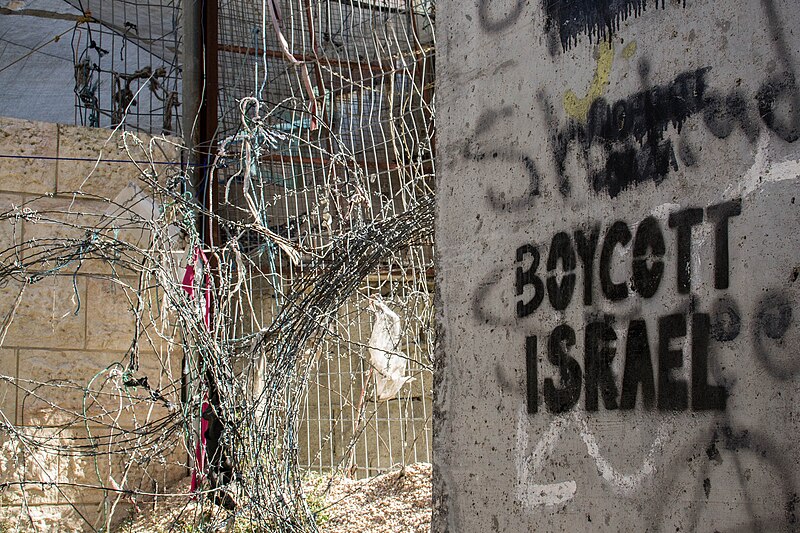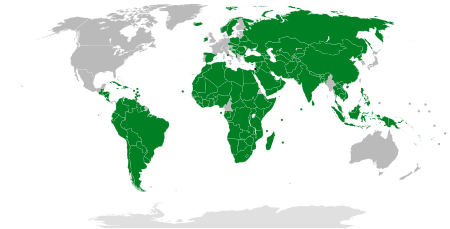Palestine Solidarity: united, defiant, focused
by Leila Ryan
Following the International Court of Justice’s finding that Israel’s collective punishment of Gaza amounts to plausible genocide, the International Criminal Court, last November, issued unprecedented arrest warrants for Israel’s prime minister Benjamin Netanyahu and defence minister Yoav Gallant. Neither has yet been detained and they are clearly expecting friends in high places will shield them from justice.
COMPLICITY WITH ISRAEL
The genocidal onslaught lasted from 8 October 2023 to 19 January 2025, the day before their most powerful friend, President Trump, was inaugurated in Washington. The subsequent ceasefire could have been agreed as early as May 2024 had Netanyahu and his Western backers not preferred ongoing genocide instead.
At the time of writing (4 March 2025), Israel and its US sponsor seem to be bringing the ceasefire to an abrupt end, opening the way to the completion of the genocide either by resuming direct military assaults or doubling down on the other war crimes of starving Gazans into submission and forcing them off their land. (1)
Israel’s genocidal actions from October 2023 to early 2025 were so dependent on Western military, diplomatic and propaganda cover that the US, Britain, Canada, Australia, Germany, the Netherlands (and possibly other countries) amply deserve prosecution alongside Israel itself, even if some alternative strategy – or renewed global outrage – halted the genocide altogether.
There should also be room in the dock for Poland, which has NATO’s biggest army in Europe. On 27 January 2025 (Holocaust Remembrance Day), in a serious case of obstructing the course of justice, the Polish government gave Netanyahu immunity from arrest so he could attend the 80th anniversary of the liberation of the Auschwitz-Birkenau concentration camp. By inviting Netanyahu, the butcher of Gaza, the Polish government insulted the memory of the nearly 47,000 Palestinians killed up to that time in the Gaza genocide. As if that were not insulting enough, it also failed to invite any Russian representative to the anniversary event, thereby also insulting the memory of the 600,000 Soviet Red Army troops who gave their lives freeing Poland from Nazi invaders and liberating Auschwitz-Birkenau in 1945.
ACCOUNTABILITY FOR GENOCIDE
The Gaza genocide was the most intense and large-scale slaughter and displacement of Palestinians since the original Nakba (“catastrophe”) or ethnic cleansing, on which Israel was founded as a settler colony back in 1948. The global and almost 24/7 coverage of what Israel did to Gaza in 2023-2025 makes it the first genocide to be live streamed on social media. It cannot now be wiped from the collective memory of mankind.
Those responsible for any state’s complicity with genocidal Israel are now being targeted in campaigns by their fellow citizens and others. Beyond and within nation-states, transnational corporations and public bodies will be coming under closer scrutiny than ever for evidence of complicity with apartheid at best and genocide and other war crimes at worst.
The ICC’s evidence against prominent perpetrators Netanyahu and Gallant is already in the public domain but others are also being pursued. Campaigners in Belgium are seeking posthumous justice for six-year-old schoolgirl Hind Rajab, who witnessed the deaths of five of her family before her own last moments were recorded in a phone call for help to a medical aid worker. The family had been fleeing south by car from Gaza City on 29 January 2024. They were slaughtered by potentially identifiable members of Israeli ground forces. (2) Other activists in Brazil and Sweden, for example, are pursuing further cases in which recorded evidence shows Israeli soldiers breaking international or humanitarian law.
Although Israel gives its citizens in the IDF impunity from prosecution, the activists hope that where an accused soldier has dual nationality, a non-Israeli jurisdiction may permit a formal trial. If that happens, at least some of the truth about its conduct, which Israel’s prohibition on media access to Gaza during the genocide was meant to restrict, will at last be made public.
Even before his inauguration, President Trump had begun defunding UNRWA, the United Nations Relief and Works Agency for Palestinian Refugees in the Near East. He also explicitly proposed the ethnic cleansing of Gaza – a war crime - which he declared the US would then take over. Simultaneously, his administration is encouraging the intensified repression and further illegal settlement expansion already underway in the West Bank.
A PEOPLE UNITED STILL UNDEFEATED
The terror already unleashed on Gaza has failed in its declared objective of destroying the resistance. Neither has it broken the spirit of Gazans or Palestinians as a whole.
The sheer scale and intensity of what Palestine has endured so far and its uncertain future can have a numbing effect on those contemplating it (or averting their eyes from TV coverage of the carnage or its after effects). Yet millions who in their own lifetimes knew neither the horrors of South African apartheid nor the satisfaction of helping defeat it now know enough about Israeli apartheid to be ready, in growing numbers, to help dismantle it.
The only antidote to despair is to get involved. The rest of this article will therefore consider some of the plans recently announced by the main body organising solidarity with Palestinians.
PALESTINE SOLIDARITY CAMPAIGN
After a year of unprecedented growth in activity and membership, the Palestine Solidarity Campaign (PSC) (3) held its packed annual general meeting in London on 1 February 2025. The AGM featured lively debate but impressive self-discipline and unity of purpose. One issue likely to resurface, as the UN and other international bodies, and civil society solidarity, all have a role in ending Israeli apartheid, is how these forums of action can best work together. The recognition of Palestine as a state (whatever the ultimate form of that state, to be determined by the Palestinians themselves) currently divides PSC members even though most countries officially recognise it (shown in green on the map opposite). (4)
TRADE UNION LINKS
Building on past successes in winning commitment to Palestine from union executives and conferences, above all at last year’s TUC, a programme of activities is planned to encourage further support throughout union structures and in workplaces as well. Workers experiencing falling living standards will become increasingly aware that potential restrictions on the right to protest about Israel can also be used against those taking industrial action.
BOYCOTT, DIVESTMENT, SANCTIONS
At the heart of PSC’s campaigning work for 2025 is a strategic expansion and intensification of boycott, divestment and sanctions (BDS) campaigns against Israel and its accomplices – the flexible, coherent, realistic, manageable and monitored approach launched by the Palestinian-led BDS national committee back in 2005, and which has proved itself ever since with a growing list of successes, each building on those that came before.
It was especially appropriate, therefore, that guest speaker Omar Barghouti, perhaps the best-known founder of the BDS movement and its most eminent champion, reminded those present how BDS is geared to the overall Palestinian demands for freedom, equality and justice, and is an opportunity to popularise the cause of Palestinian self-determination. (5)
The AGM heard of a new decision to add Coca-Cola to PSC’s existing portfolio of apartheid-complicit targets; the company’s welcome vulnerability on this issue is suggested by how its sales have plummeted in the Middle East since the start of the genocide. It would once have been unthinkable to take on a well-resourced behemoth like Coca-Cola, so this is a sign of how things are changing. (Since there was no Coca-Cola nor even Pepsi available at the AGM’s buffet lunch, delegates happily drank Palestinian owned Gaza Cola, or Cola Gaza, instead). (6)
BARCLAY'S BAD HABIT
Pressure will also be increased on savers and investors to withdraw their accounts from Barclays Bank, which helps finance the arms trade with Israel in violation of international law.
The bank was once a major corporate prop of white minority rule in South Africa and only later admitted how the anti-apartheid movement’s successful campaign for students to close their accounts had rattled its London board. The thinking behind the boycott was that, at least in those days, students going to college opened bank accounts and tended to stick to the same provider after graduating and perhaps for the rest of their lives. There was therefore sharp competition between rival banks to get students to sign up with them. No wonder Barclays were dismayed to find existing student customers, disgusted by the bank’s complicity with South African apartheid, closing their accounts and switching to a non-complicit competitor. Perhaps a new push on behalf of Palestine will help Barclays finally kick its bad habit of underwriting apartheid regimes.
“EVERY LITTLE HELPS” (Thank you, Tesco)
Another echo from the past is the successful boycott of South African apartheid produce. The PSC executive and delegates enthusiastically endorsed the idea of a simple leaflet aimed at supermarket shoppers that will list the most common Israeli products to avoid buying and suggest more ethical alternatives. This harks back to the still-widely remembered boycott of Outspan oranges, which encouraged a convenient and eventually habitual token of support for the victims of apartheid while doing little more than the weekly shop. This campaign was never likely nor intended to undermine apartheid all on its own, nor did shoppers expect it to; but who knows what its cumulative effect may have been?
Yet many people expressed themselves in this modest way, signalling (even if only to themselves) whose side they were on - a private gesture for which you don’t even need to be an activist. Those arguing for something similar now guess that Israel’s reputation among the general public has fallen so far that such an idea might well catch on again. We shall see. It’s not clear if Jaffa oranges will make it onto such a list, but if they do, shoppers might be reminded that boycotting Outspan helped bury one kind of apartheid and doing the same to Jaffa could help bury another.
Next steps
In mid-January 2025, some commentators, including London Mayor Saddiq Khan, naively declared that the imminent ceasefire in Gaza meant demonstrations for Palestine should end. If the Mayor thought a ceasefire, especially one as curtailed as Israel now seems to think it can get away with, was all that Palestinians could hope for, or would clear marchers from London’s streets, he was predictably mistaken. Moreover, the failure of attempts over the following few days to demonise or criminalise pro-Palestinian demonstrations, especially one in London on 18 January 2025 opposing the BBC’s bias against Palestinians, has strengthened the resolve of the solidarity movement to continue its actions unintimidated by genocide apologists.
At its AGM, PSC Director Ben Jamal gave a defiant answer to Saddiq Khan and his fellow critics: the solidarity movement will never be silent until every Palestinian, wherever they are, has the right to return to a free Palestine.
All online references given below were accessed on 4 March 2025.
(1) https://www.aljazeera.com/news/2025/3/2/israel-reneges-on-ceasefire-deal-warns-hamas-of-consequences Without exception Western mainstream media have blamed Hamas for ending the ceasefire and have barely reported recent Israeli attacks on Damascus.
(2) https://youtu.be/LiWVgnCp8Z0?si=Xob66rrEA2bSC6Iv
(3) The Palestine Solidarity Campaign is not the only pro-Palestine campaigning body in England and Wales but, with about 100 branches, it is the broadest-based and most experienced. Scotland and Ireland have their independent equivalents. For more information about its work, including campaigns etc. not mentioned in this article, see: https://palestinecampaign.org/
(4) More detailed information on this issue are available at: https://en.wikipedia.org/wiki/International_recognition_of_Palestine#:~:text=Among%20the%20G20%2C%20nine%20countries,the%20United%20Kingdom%2C%20and%20the
(5) https://youtu.be/O5RkUQ6ZgCc?si=8zDjX3kbOAEXWNE2
(6) www.colagaza.com. According to its website, this product is 100% Palestinian owned and (as if not being Coca-Cola were not enough) all profits go to rebuilding hospitals in Gaza

A message from Palestine. Photo by Sete Ruiz
Another echo from the past is the successful boycott of South African apartheid produce. The PSC executive and delegates enthusiastically endorsed the idea of a simple leaflet aimed at supermarket shoppers that will list the most common Israeli products to avoid buying and suggest more ethical alternatives.







